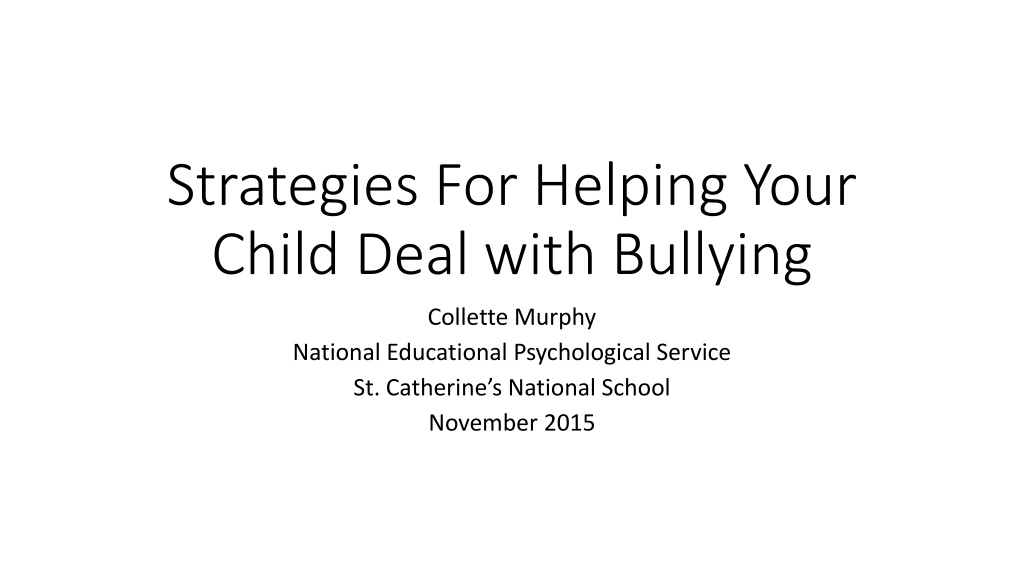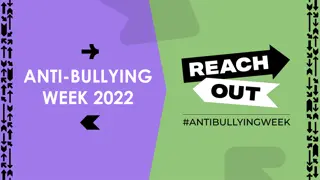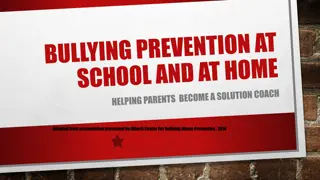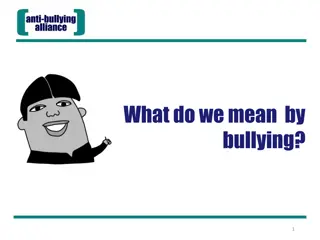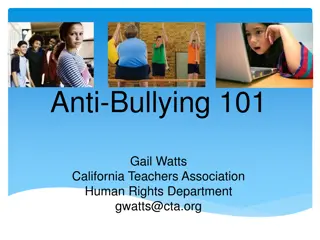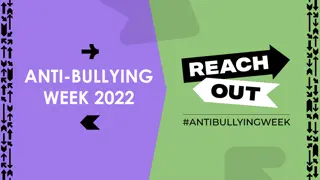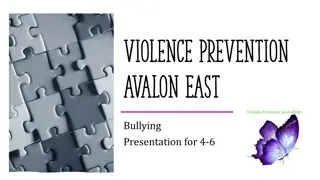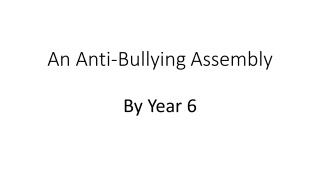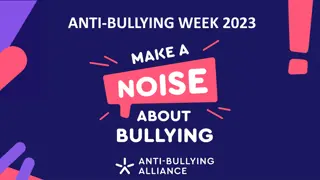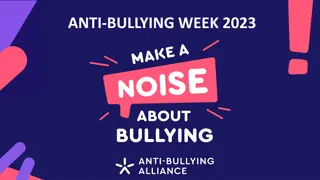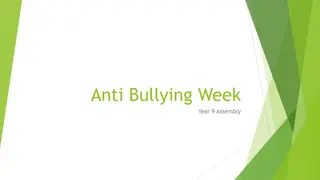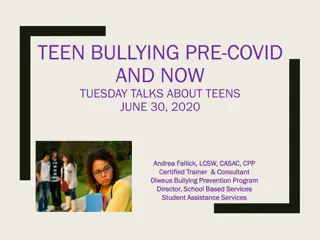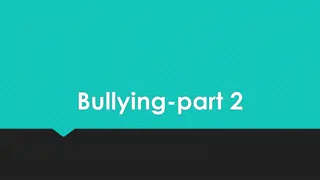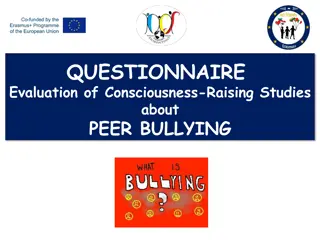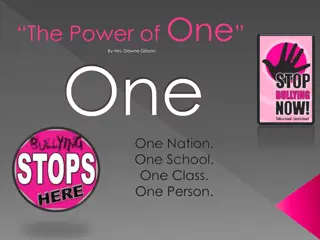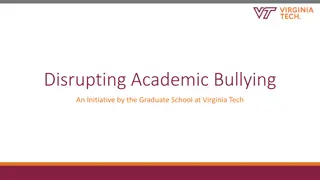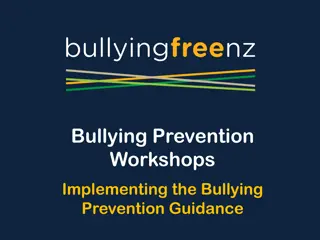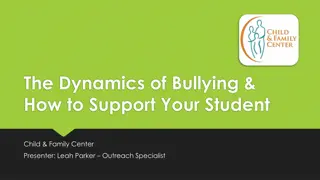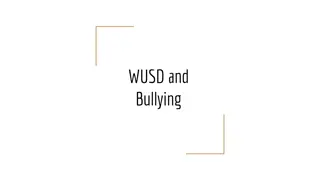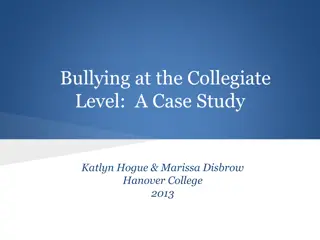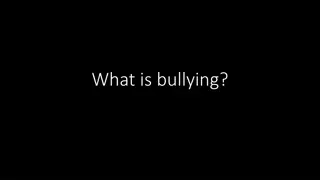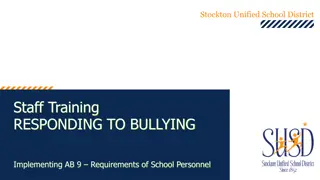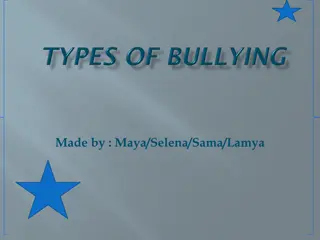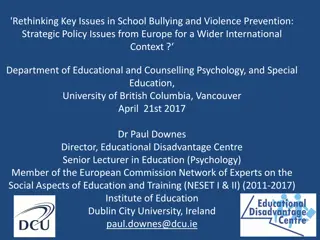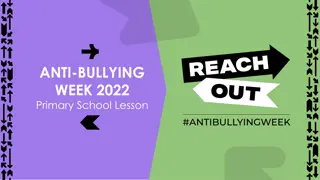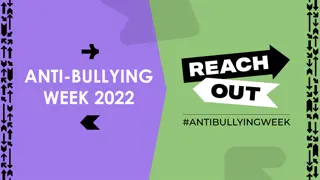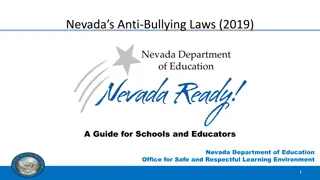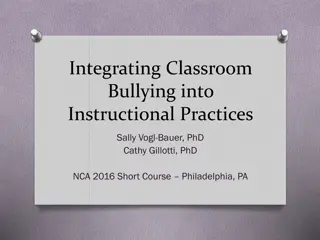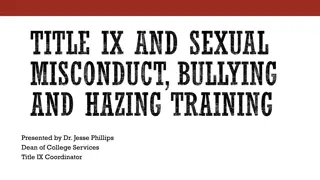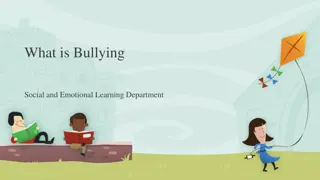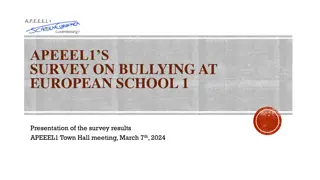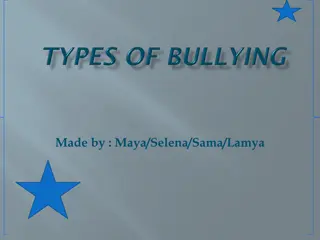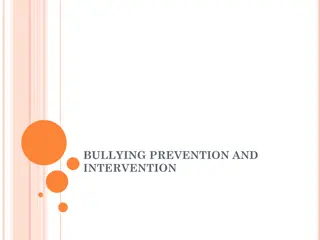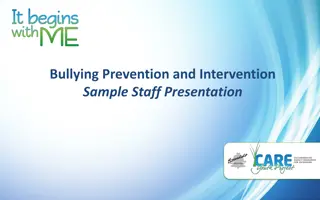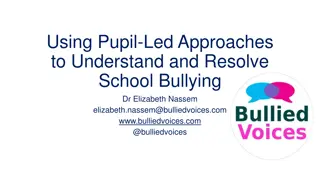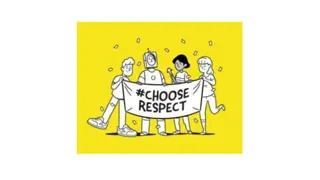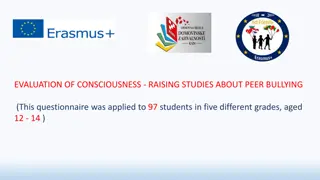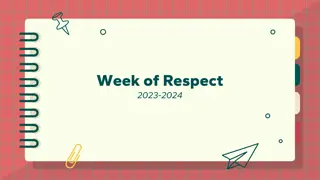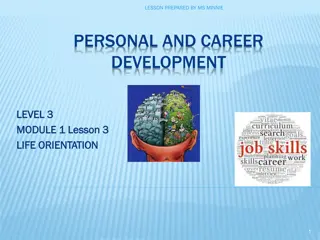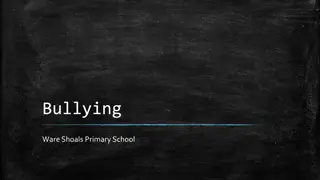Strategies for Helping Your Child Deal with Bullying
Bullying is a silent nightmare that many children face, leading to feelings of loneliness, unhappiness, and shame. It can affect their confidence, behavior, and even physical health. Understanding what bullying is, its impact, and how to address it is crucial for parents and schools to support children effectively.
Download Presentation

Please find below an Image/Link to download the presentation.
The content on the website is provided AS IS for your information and personal use only. It may not be sold, licensed, or shared on other websites without obtaining consent from the author. Download presentation by click this link. If you encounter any issues during the download, it is possible that the publisher has removed the file from their server.
E N D
Presentation Transcript
Strategies For Helping Your Child Deal with Bullying Collette Murphy National Educational Psychological Service St. Catherine s National School November 2015
Whats all the Fuss? Part of growing up? Only a bit of harmless fun? Can help children learn to stick up for themselves? Something children just have to put up with? Something children have to learn to sort out for themselves?
Reality A big fear for many children Most children are bullied at some time during their school lives No parent can be confident that his/ her child will never bully No parent can be confident that his/ her child will never be bullied School is where most bullying takes place It happens in every school
The Silent Nightmare Eventhough it may happen in front of other children, - it tends to be suffered in silence - it thrives on fear and secrecy Can lead to: -Feelings of loneliness, unhappiness, shame -Loss of confidence -Withdrawn behaviour - Illness physical, psychological, mental health issues
Nightmare.contd - May try to deny/ turn their back on what they feel is responsible(e.g. their difference ) - May take out their anger or frustration on family members In school, - May be tense - May be easily-distracted - Behaviour may be affected - School progress may be affected - May not want to go to school - School is miserable
What is Bullying? unwanted negative behaviour conducted by an individual or group against another person (or persons) and which is repeated over time aggressive behaviour which is an abuse of power by an individual or group of individuals against others . Usually deliberate and repeated It can be: - Verbal -Cyber - Social - Psychological - Material - Physical
Who? No such thing as the Typical Bully We can all bully at some time Sometimes can see: - limited confidence - unhappiness - jealousy - being bullied him/ herself
Why? Will engage in bullying behaviour to achieve a range of things, including: -To make up for a lack of success -To gain attention -To look tough -To get rid of anger -To get some fun or excitement out of others fears -To make the group feel closer/ to keep friendship groups -To gain material things
Who? (Victim) Anyone can be bullied Many children are bullied for no particular reason More likely to be bullied if seen as: -Vulnerable -Different -Spend a lot of time alone
Do you always know if your child is being bullied? Why Victims (or those observing) Don t Tell Fear Shame Don t want to worry parents Don t want to be a telltale
Do you always know if your child is being bullied?...Contd Possible Warning Signs Sudden Big Changes in Behaviour: -Unwilling to go to school, frightened of walking to/ from, changed route -Begin doing poorly in work -Begin bullying siblings; become irritable/ aggressive; have temper outbursts -Changed eating patterns eat more/ eat less -Changed sleeping patterns sleep more/ sleep less, have nightmares -Become ill - Become withdrawn, drop his/ her interests
What To Do? Aim: Restore/Instill Confidence In Your Child s Ability To Sort Things Out Firstly, Be aware of your own emotions and responses . Anger? Anxiety? Disappointment? Frustration? Sadness? Confusion? Helplessness?
What to Do contd Unhelpful Responses: Leave it to me I know exactly what to do We ll sort it out in no time I want to know everything I don t need to know the details No need to get upset That s nothing . When I was at school
What to Docontd Stop, Stay Calm, Think Things Through It s important your child feels you are in control Let your child know you believe her, you re pleased she has told you, it s not her fault, she is not the problem, you re sorry it has happened Check how she is feeling Anger? Shame? Fear? Check is she believing the things said about her (if Verbal/Cyber Bullying) Check if she is feeling that she s the only one being bullied Check if she s concerned about her safety Approach it as a problem to be solved
What To Do contnd Find out the Facts but go at the child s pace; resist persistent questioning Assess the seriousness of the bullying behaviour: Which forms of bullying? By whom? How often? For how long? -How much was/ is your child hurt? -How much do you/ your child think the bullying child intended to hurt? Give your child the chance to express why she thinks it might be happening Give your child the chance to suggest ways of dealing with it If the problem persists, go to the school; nip it in the bud- don t wait til parents night; often teachers don t know anything about the bullying; check how your child is in school Keep a record of incidents- who, when, where, how
What To Do. contnd Afterwards .Help your child to: Continue to express any feelings she has about what happened/ happens at school; if the bullying was short-term, perhaps don t keep bringing it up; if it was long-term, don t not bring it up for fear of reminding her of the past.. Your child will be thinking about it for a long time Practise ways to defend/ stick up for herself see below Plan a (positive and realistic) response to the behaviour if it were to happen again Encourage friendships/ opportunities for making friends Encourage a new hobby or skill to boost confidence Encourage an after-school activity (one perhaps with a lot of structure/ support at first) Teach Playground Skills . see below Be aware of what your child is observing at home in terms of communication skills, dealing with conflict, expressing feelings, problem-solving skills, etc. Be a refuge: patience, support, unconditional love, time .
Should My Child Hit Back? Able to/Want to? Are you condoning aggression? Will it get your child into trouble? Will he/ she be able to fight all the friends of the child who is bullying? Are you avoiding dealing with it as a parent?
What Children Can Do (i.e. Options)When Bullying Happens Child might choose among these React quickly, assertively and calmly with a loud command: Stop!, No!, Get lost! and walk away Think up short punchy replies to the usual comments/ names you get Try to look confident..keep head up, look in the eye Think: I m not the problem it s not my fault . There s nothing wrong with me identify negative self-talk substitute positive self-talk Take deep breaths Don t show you re upset Try not to react to what they do/ say .Ignore . But don t ignore how you feel Stop Think .Do
OptionsWhat Children Can Do.contnd Accept their decision (if you have been excluded)- all kids get left out sometimes Tell them how you feel That s not a very nice thing to say/ do but said in a controlled assertive manner Try to feel good about yourself . spend time on interests/ skills Find another friend Think about why you might be being bullied . Does this give you any other ideas re. what you might do?
Playground Skills Social Skills Friendship Skills Assertiveness Self-Control See attached List of Playground Skills
